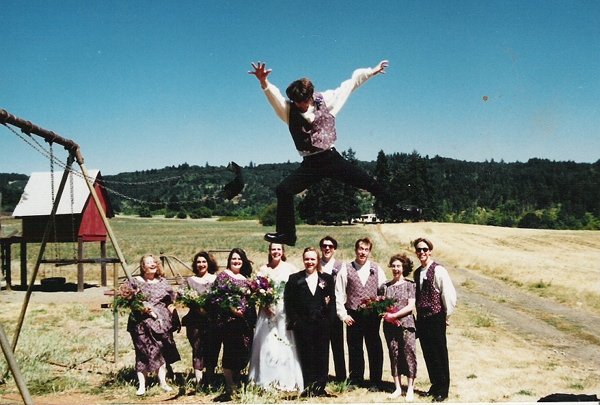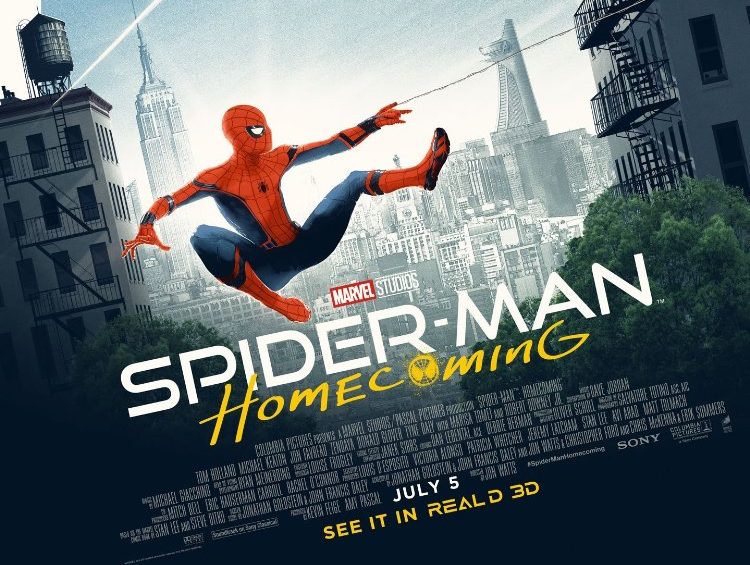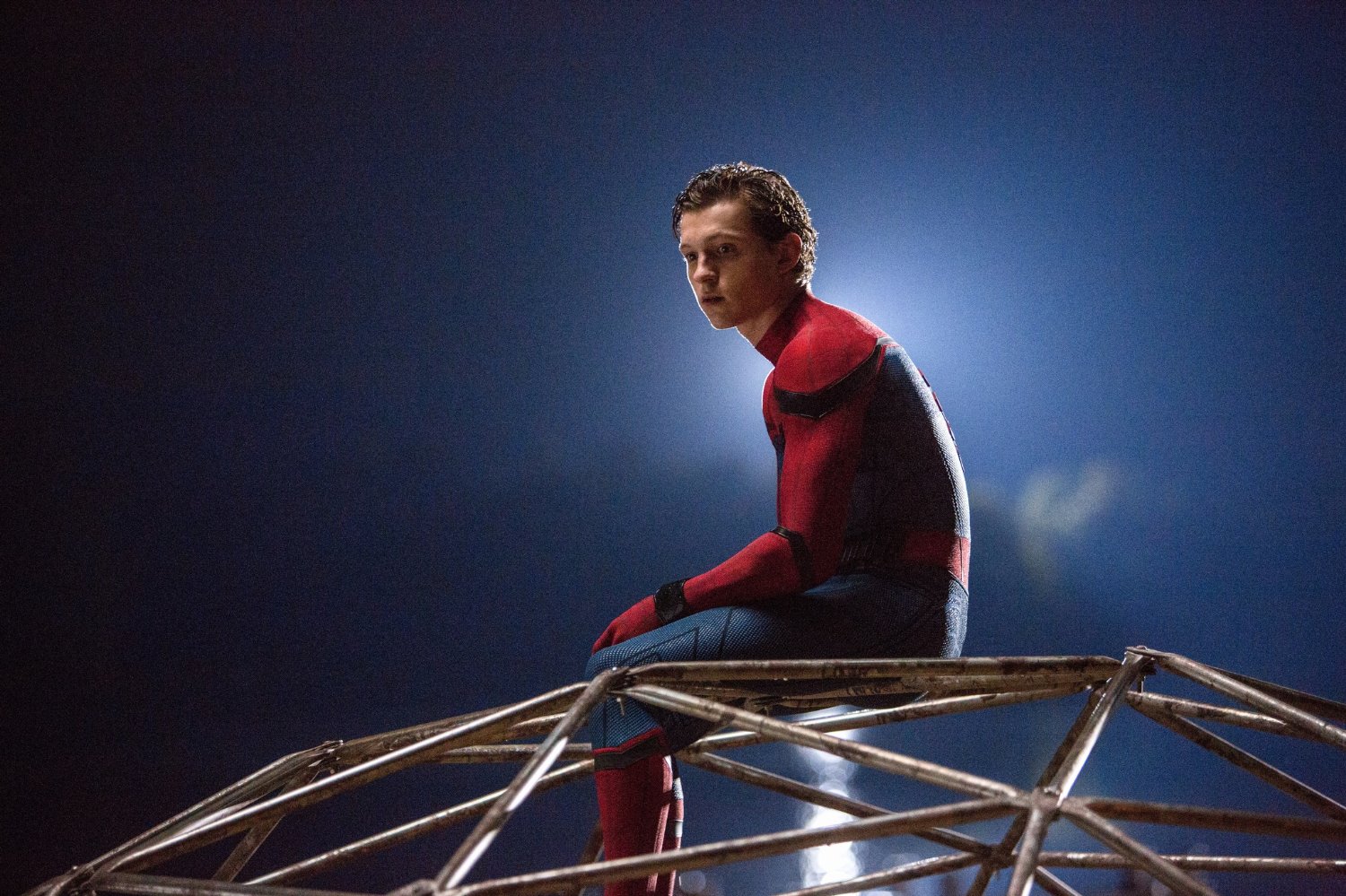In my favorite wedding photo, my friends Melody and Geoff and their wedding party, all dressed up, stand on a playground near Salem, Oregon, looking formal and organized. Me? I’m in the air above them, limbs splayed like a dancer who doesn’t know what he’s doing. I’ve jumped from a swing on a swingset at the edge of the frame — a detail most people don’t even notice when they first look at the image. I’ve had people look at it and say “How in God’s name did you jump so high?” The photographer caught me at just the right moment after the launch.
And yes, I scuffed up the knees of my slacks when I landed.
It’s one of my favorite photographs: It captures exactly the flamboyant enthusiasm I felt about seeing my friends take their own leap into the wild blue of marriage.
But it wasn’t just the wedding that I was excited about. It was the swingset.
I used to love swings as a kid — the sense of freedom that came from testing the strength of those tethers, the strange sight of my feet kicking the clouds and the bright blue ceiling, the feats of courage that became possible when I could trust the anchor of the swing.
A few weeks ago, Anne and I visited an empty park just down the road from our house. Drawn to the swingset, I realized that I couldn’t remember the last time I’d gripped those chains, dared myself to see how high I could go. I had forgotten how much I loved that dizzy rush.
And then I felt it again the next day, sitting up straight in a faux-leather recliner in the Regal Alderwood Stadium 7 Movie Theater watching Spider-Man: Homecoming.
I don’t know why I’ve never wondered about this before: Why Spider-Man? Why was he the only superhero who captivated my imagination when I was a kid? Why did Superman fly right over my head without turning it? Why did Batman stay in the shadows, a figure of only mild curiosity? Spider-Man… I wanted the mask. The whole costume. The webslingers.
Perhaps it had something to do with spiders. Spiders scared me. The idea of being bitten by a poisonous spider was the stuff of nightmares. (Watching what happened when my younger brother was bitten by a brown recluse only amplified my phobias of those eight-legged invaders in my basement.) In The Auralia Thread, my series of fantasy novels, trees become diseased, and their branches break free and become vicious spider-like monsters.

Was Spidey my hero because he takes the powers that scare me and makes them his own?
Was it that Peter Parker is a kid? Superman is a grown man, after all. But wait — no, he isn’t. He’s an alien. His human identity is his alias. That sets him apart from my experience. Batman, he’s wealthy… which is even more foreign to my experience than being an alien. But Spider-man… he blends into his high school class, and lived out my superhero fantasies as an afterschool special.
I asked my friends on Facebook: Do they agree that Spidey is more compelling than Superman? A flood of affirmatives followed, like these:
“Superman is boring. … Spider-man struggles with teen stuff and he’s got a really funny fast wit. Superman just punches.”
“It’s hard to make a literal god interesting in a fight. You know the whole time [Superman’s] just holding back so he doesn’t accidentally erase the planet. Spidey, however, has some stuff to work through and he’s rather fragile in comparison.”
“Spider-Man is more relatable to kids since he’s kinda a kid himself with common, everyday problems, like doing well in school and getting a job. Whereas, Superman seems more distant, since he only has to worry about saving the planet and dating Lois Lane.”
“It is easy to identify with a kid who gets picked on and isn’t understood, but who secretly has great powers.”
“I really think it’s the outfit. Spider-Man just looks cooler to a kid. Most of the kiddos who are into Spider-Man have never seen one of the movies (mine and most of his friends). He saw a picture of Spider-Man with a bunch of other superheroes and he zeroed in on Spider-Man — when he was 3. There’s just something about that mask, I think.”
All of these replies are interesting. But I can’t find, in any of them, an explanation for why I’ve always found this character to be so much more compelling than other superheroes. I think it’s something else. The answer that resonated with my discovery came from 7-year-old Owen:
“I ask myself, ‘Would I have fun being that person? Spider-Man? Yes. He can shoot webs and swing from them. Superman? He can just shoot laser beams and fly.'”
That’s it. It’s not just that he’s a web-slinger. He swings.
You see, I’ve had dreams of flying, but I’ve never really done it. I wanted to fly when I was a kid, but the closest I could come to it was to climb onto the thick, bristly rope swing that hung from the towering birch in my backyard, kick off from the trunk, and swing in as wide a circle as I could manage. With the end of the rope firmly fixed to a high branch, I could swing my feet and soar up past the edge of the roof of my family’s one-story house. I could stand on the rope’s fat knot and spin as I swung. I could grip it tightly and raise both feet up into the air.
This was more fun than jumping out of trees and crashing to the ground. There was tension. There was arc. There was the sense of being free and yet held. In a word: suspense.
When I watch Spider-Man sling his webs and Tarzan-vine his way from building to building, I know what that feels like. I can feel his exhilaration. It’s just like dreaming of having my own race car — it’s a thrilling prospect because I know the sensation of driving.
What’s more, there is something deeply human about the feeling of a swing. We want to fly, yes, but we also fear the consequences. A swing remains bound, anchored, trustworthy. It keeps us from sailing free of our moorings. It’s the financial security that allows us to make a wild bet. It’s the family that’s there to catch you if your dreams fail and you fall.
And in the parlance of art, it is the firmness of real-world particularity that allows us to suspend our disbelief when we watch a movie, read a novel, or hear a song. We can lose ourselves in the wildness of The Lord of the Rings because we are anchored in the simplicity of the Hobbits. We can delight in wackiness of The Princess Bride because we always come back to the fact that it’s a story read by an old man to his grandson. We love Sgt. Pepper’s Lonely Hearts Club Band because, for all of the psychedelic tangents, the songs are always drawn back to such simple and effortlessly lovely melodies. We watch CGI Transformers bound around the globe in Michael Bay action movies, but we don’t believe what we’re seeing unless they land with convincing weight; our faith in what we’re shown depends upon the grip of gravity.
When it comes to superhero movies, I love those that keep me grounded with some measure of human experience. When I watch the Hellboy movies, for example, I’m delighted because Hellboy, despite his spectacular backstory, his fantastical powers, and his monstrous appearance, has such recognizably human traits. He snarls and curses and fails. He likes kittens and sings Barry Manilow songs. He’s not a god duking it out with villains in the skies or smashing skyscrapers — at least, not very often. He captures my imagination with superhuman heroics precisely because there is a line connecting him to familiar human experience.
In that, Spider-Man’s webslinging ways become a metaphor for the humanity at the heart of the stories — like Harry Potter who came after him, he’s an insecure kid discovering his talents, and he can use them heroically so long as he doesn’t lose his anchor… that connection to gravity that creates and controls what Annie Dillard calls “the tension of the audience’s longing.”
Spider-Man, well… he don’t mean a thing if he ain’t got that swing.
•
Tomorrow — Part Two: My review of Spider-man: Homecoming.


